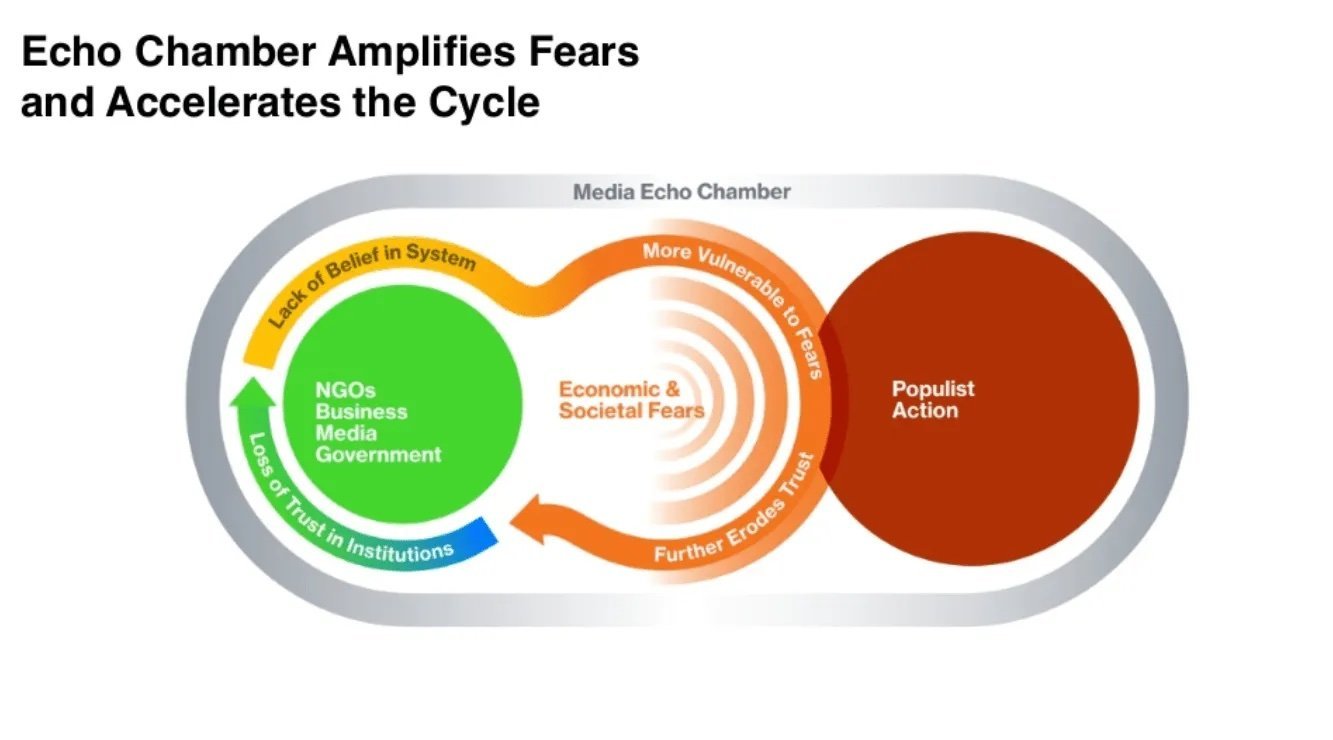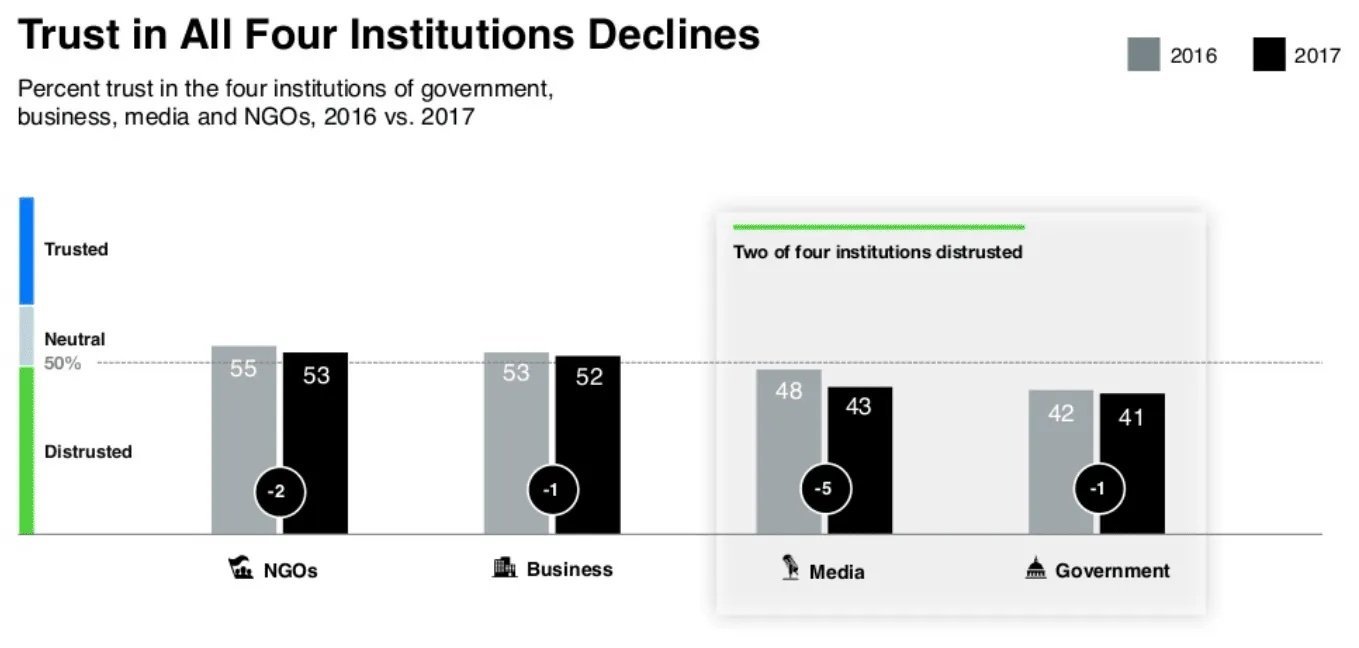Why Trust Has Become Your Business
Classify this one under “obviously.” Last week, Edelman, the global communications firm, released its annual Trust Barometer: a survey of tens of thousands of people in 28 countries.
Given that this year’s survey took place over the time of the US Election, it’s not surprising that the results aren’t good. But it’s worth digging into the details — to better understand the state of the global psyche and the implications for business people.
The Gory Data
According to the report, on a global basis, trust in all four major social institutions — business, government, NGOs and media — has declined since last year.Respondents were asked how much they trusted each institution to “do what is right”. A majority of global respondents replied that they distrusted both media and government — with NGOs and business not far behind.
Further underscoring what the report calls the “trust crisis” is a precipitous drop in the lack of credibility of leadership — particularly CEOs, who dropped 12 percent from last year’s survey.
Only 37 percent of the general population now say CEOs are credible, and 29 percent say the same about government officials.
Declining trust in the credibility of leadership has led to an accordant drop in trust for the system. An astronomical 53% of survey respondents reported a belief that the system is failing them, with a further 30% replying that they are uncertain.
Why is trust declining?
This is a sophisticated and deep question — one I ask often to participants of my Strategic Storytelling Workshops. Anecdotally, most answers I receive focus on the role that the consumer-facing Internet has had on our lives. “There’s too much information.” “There are too many voices. It’s hard to hear myself think.” “It’s too hard to figure out whether the news I read is real or fake.”
The Edelman report calls this the Echo Chamber effect. The more trust we lose in our institutions, the more faith we lose in the System, the more vulnerable we are to politicians and businesses that exploit our fears, and the more likely we are to try to shut out the outside world.
52% of people “never or rarely” change their position on important social issues.
Trust is big business
Rationally, avoidance of change is an untenable position for either a citizen or a business, given that we live in a time marked by fundamental and transformative change. We work differently, we connect differently, we relate differently, we socialize differently and we perceive the world differently, not least due to the impact of our technology.
It’s not too grandiose to say that the world’s fastest growing industry is coping with change.
With trust in government and media plummeting, businesses have stepped into the void, constructing optimistic, almost political visions of a better future. (For example, over the past two weeks, since President Trump’s executive order on immigration, dozens of corporations have publicly expressed their opposition; last night’s Super Bowl was notable for equality-themed commercials from Coca Cola, AirBnB & Audi, among others.)
Explicitly, the goal of these ads is to build what marketers call “sentiment” — good feelings that are tied to the brand. But the sheer volume — and near ubiquity — of this style of advertising implies a connection with the underlying lack of trust in the marketplace.
Simply put, consumers are searching for something to believe in. Trust has become big business
Trust in the workplace
Those trust-hungry consumers aren’t some arbitrary data point. If the lack of trust is so pervasive out there in the world, then it’s surely visible inside your organization.
Accordingly, we can hypothesize that workplaces and teams that give their employees something to believe in will outperform those that don't.
This data is borne out by a study released last year by Google — a two year internal study into what makes a team effective. At the beginning of the study, Google made a hypothesis that would seem pretty straightforward to most of us: effective teamwork is the result of some perfect mix of individual traits and skills.
In Google’s words, “we were dead wrong.”
Who is on a team matters less than how the team members interact, structure their work, and view their contributions.
Google learned that there were five key dynamics that set apart successful teams within their culture. The first dynamic — and, according to Google, by far the most important — was a concept called “psychological safety” — the willingness to take risks without feeling insecure or embarrassed.
Individuals on teams with higher psychological safety are less likely to leave Google, they’re more likely to harness the power of diverse ideas from their teammates, they bring in more revenue, and they’re rated as effective twice as often by executives.
Why Trust Has Become Your Business
As businesses, what we actually sell will — or already has — become secondary to the sense of trust we integrate into our goods, services and approach to management. In a world full of people searching for something real to put their trust in, our challenge — and opportunity — is to becometrustworthy.
By being trustworthy, we become more receptive, more engaged and more connected with the growing number of people searching desperately for something to believe in.
I believe our current era will be remembered as an Age of Purpose — a time when global circumstances separated those working towards something and those who are content with nothing.
Which side does your business fall on?



